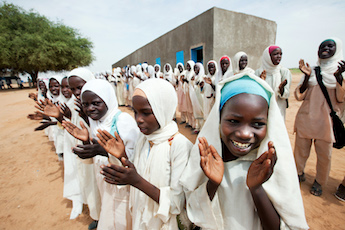Water. That incoherent voice in your head probably read it as it appeared before your eyes. What connections did you just make, just now? Maybe you thought of the beach, ponds, or the Charles River (if you’re from Boston). Maybe you thought of faucet water, taking a hot shower, or even sipping on a nice cold bottle of LIFE WTR. Whatever associations you’ve made when you hear the word; water, it typically is derived from your experience with the liquid substance.
What if your experiences or associations were drastically different though? What if water, to you, meant safety hazards, sanitation, clean/dirty, shortage of supply, daily chores, or risk of infection? For many low-income areas across the rural, global South, these connections are common.

Source: https://www.unwater.org/water-facts/gender/
The image shown above is nothing less than a powerful one. For many young women across the Global South, going to school is a scarce privilege. If they are not tending to the duties of the household, women are expected to retrieve water that would be used for cooking, cleaning, bathing, and sanitation. Water sources were not always in close proximity either. According to the Unwater organization, this took up the majority of a day to complete. In 25 Sub-Saharan African countries, women collectively take up “16 million hours a day collecting drinking water.” The data is extremely disproportionate to that of men. Ultimately, this task would have a poor effect on women’s access and time for education. “Reducing the time it takes to fetch water from 30 to 15 minutes increased girls’ school attendance by 12% according to a study in Tanzania. (UNICEF).” This is a major issue. Because of environmental degradation, women are suffering. They are being held to a low societal standard in response to the drying environment that surrounds them. These women deserve an education that serves them.

It is appropriate now, then, to introduce Bina Agarwal. In her chapter of Feminist Studies; The Gender and Environment Debate: Lessons from India, she tackles eco-feminism in a very new and critical way. She argues that women, especially in poor rural areas, “are victims of environmental degradation in quite gender-specific ways.” (Agarwal, 119) This contrasts the popular Western version of ecofeminism that women are connected to nature through that of domination, healing, and restoration, it has more ideological ties. This belief places anything female and nonhuman below men, according to Agarwal. This we know to be true. However, Agarwal brings attention to the pre-colonial period in the Third World, where conflict already existed between class, race, sexuality, and gender. “Poor peasant and tribal women have typically been responsible for fetching fuel and fodder and in the hill and tribal communities have also often been the main cultivators.” (Agarwal, 126) With this information, we can conclude that women learned more about nature than men through experience and interacting with it. Thus two interpretations could spring from this history: women are both “victims to the destruction of nature and as repositories of knowledge about nature, in ways distinct from the men of their class.” (126).
Taking in this non-Western perspective- which I have only begun to grasp in its entirety- and comparing it with that of Warren and Hobgood-Oster, I cannot decide which I find more appealing. Both stances speak to a different interpretation of women’s history, both encourage the destruction of the patriarchy which I truly enjoy. I admire how the Industrial Era is tied to colonial men and environmental degradation in Agarwal’s writing. It seems only fitting, seeing as women were generally prohibited from these professions therefore have no ties to our environmental crisis. I will have to ponder further!!
Everything in love,
Cece x
Hi, of course this paragraph is genuinely pleasant and I have learned lot of things from it about blogging.
thanks.
I just like the valuable information you supply on your articles.
I’ll bookmark your weblog and take a look at once more here frequently.
I am reasonably sure I’ll be informed lots of new stuff proper here!
Good luck for the following!
I am really enjoying the theme/design of your web site.
Do you ever run into any internet browser compatibility problems?
A handful of my blog audience have complained about my website not operating correctly in Explorer but looks great in Safari.
Do you have any advice to help fix this issue?
Feel free to visit my website – Black Myth Wukong review
Use promo code UBASO to get up to 600,000 NGN at 1xBet!
Minimum deposit 1700 NGN. Valid for 30 days.